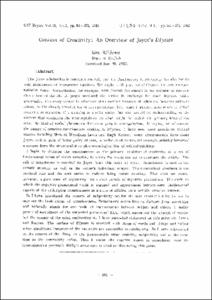교회에서 공평의 인식을 결정하는 요인과 교회에 대한 개인의 애착심
- Alternative Title
- The Factors Which Determine Individual's Sense of Justice in and Commitment to the Church
- Abstract
- 많은 학자들은 지난 40여년에 걸친 한국 개신교의 양적 성장을 박탈이론으로 설명한다. 이들은 1960년대 이후의 한국사회의 특징을 정치적 불안, 영세농민의 도시로의 이동, 전통적 공동체 상실, 빈부격차의 심화로 인한 상대적 박탈감 등으로 열거하면서, 이러한 불안감, 위기감, 상대적 박탈감 등이 많은 사람들을 교회로 유인하였다고 주장한다. 이 설명이 한국에서 경험하였던 급작스러운 개신교의 증가에 대한 실마리를 제공하기는 하나, 논리적으로나 방법론적으로 적지 않은 한계를 안고 있다.
개신교의 교인수가 증가하였다는 것이 한국에서 발생한 사회적 현상이기는 하나, 엄밀히 말하자면 그것은 교회라는 조직적 상황에서 벌어진 개인들의 행동이다. 교회 신도수가 증가하였다는 것은 교회 숫자의 증감에 상관없이 교회를 찾은 사람들이 교회를 떠난 사람들보다 많았다는 것이며, 그것은 교회에 애착을 갖는 사람이 많아졌다는 뜻이다.
이 논문은 지난 40여년 동안 한국사회가 경험했던 폭발적인 신도수의 증가 그 자체에 대한 설명보다는, 신도수의 증감에 영향을 미칠 수 있는 요인으로 개인들의 조직에 대한 애착심이라는 변인을 주목하며, 조직에 대한 애착심을 결정하는 중요한 변인으로서 조직에 대해 개인이 느끼는 만족도와 형평에 대한 인식이라는 요인을 교회의 자발적 조직이라는 상황에 초점을 맞추어 고찰한다.
Many scholars often use deprivation theory to explain the rapid growth of Korean Protestant churches during the past 4 decades. Korea, since the 60s, might be best described by political instability, massive migration from rural to city areas, breakdown of traditional community, and relative deprivation felt by the disadvantaged resulting from the worsened income disparity between the rich and the poor. The scholars attribute the unparalleled growth of the Protestant churches during the period to such factors as sense of instability and relative deprivation. This reasoning, although sheds some lights to the phenomenon, suffers logical and methodological limitations.
That Protestant population has increased is a social phenomenon surely happened in Korea. But it would be more accurate if viewed as a collective phenomenon of individual behaviors happened in the context of individual churches. The increase in the number of whole Protestant population means that there have been more people who joined than quit church and that the number of people who were committed to church has increased.
The main concern of this study is not with the explosive growth of the church-goers per se which Korean society has experienced during the past 40 years. Rather it is more with individuals' commitment to church as one of the most important variables affecting quantitative growth of church. Research findings have consistently demonstrated that sense of equity in and satisfaction with church largely determine individuals' commitment to church. On the basis of the findings, this paper explores the relationship between church commitment and sense of justice with the main focus on the voluntary nature of church.
Many scholars often use deprivation theory to explain the rapid growth of Korean Protestant churches during the past 4 decades. Korea, since the 60s, might be best described by political instability, massive migration from rural to city areas, breakdown of traditional community, and relative deprivation felt by the disadvantaged resulting from the worsened income disparity between the rich and the poor. The scholars attribute the unparalleled growth of the Protestant churches during the period to such factors as sense of instability and relative deprivation. This reasoning, although sheds some lights to the phenomenon, suffers logical and methodological limitations.
That Protestant population has increased is a social phenomenon surely happened in Korea. But it would be more accurate if viewed as a collective phenomenon of individual behaviors happened in the context of individual churches. The increase in the number of whole Protestant population means that there have been more people who joined than quit church and that the number of people who were committed to church has increased.
The main concern of this study is not with the explosive growth of the church-goers per se which Korean society has experienced during the past 40 years. Rather it is more with individuals' commitment to church as one of the most important variables affecting quantitative growth of church. Research findings have consistently demonstrated that sense of equity in and satisfaction with church largely determine individuals' commitment to church. On the basis of the findings, this paper explores the relationship between church commitment and sense of justice with the main focus on the voluntary nature of church.
- Issued Date
- 1997
- Type
- Research Laboratory
- Alternative Author(s)
- Jun, Sung Pyo
- Publisher
- 사회과학논집
- Language
- kor
- Rights
- 울산대학교 저작물은 저작권에 의해 보호받습니다.
- Citation Volume
- 7
- Citation Number
- 1
- Citation Start Page
- 75
- Citation End Page
- 106
- Appears in Collections:
- Research Laboratory > Journal of social science
- 파일 목록
-
-
Download
 000002025273.pdf
기타 데이터 / 771.94 kB / Adobe PDF
000002025273.pdf
기타 데이터 / 771.94 kB / Adobe PDF
-
Items in Repository are protected by copyright, with all rights reserved, unless otherwise indicated.